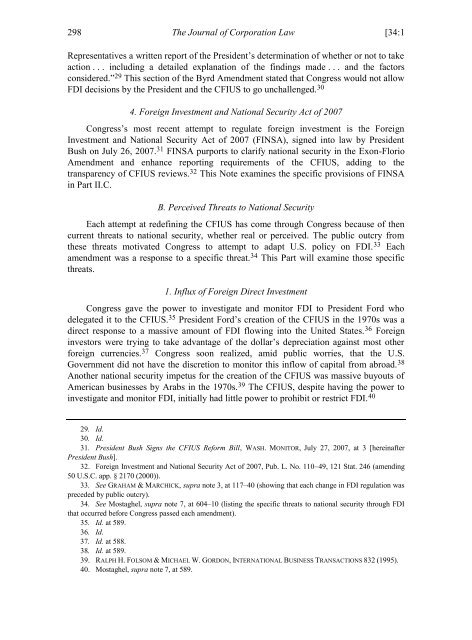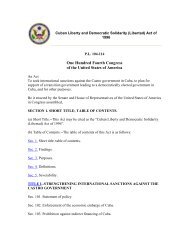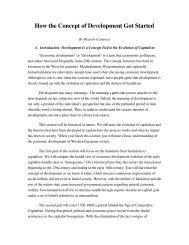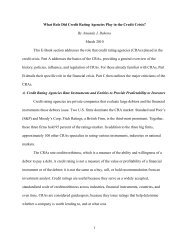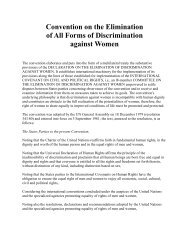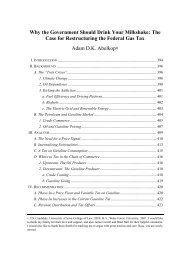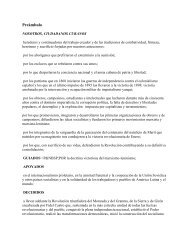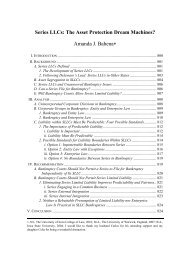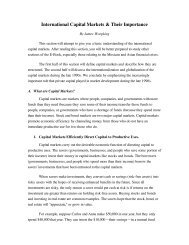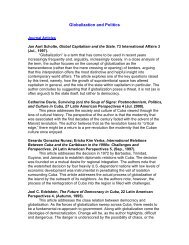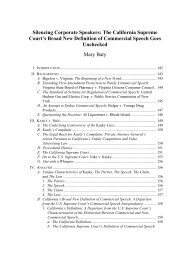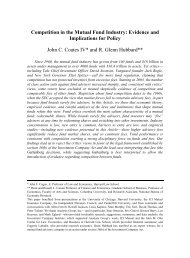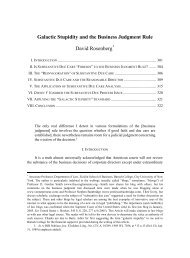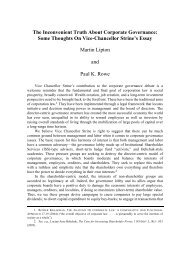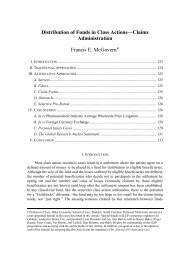Regulation of Foreign Direct Investment After the Dubai Ports ...
Regulation of Foreign Direct Investment After the Dubai Ports ...
Regulation of Foreign Direct Investment After the Dubai Ports ...
Create successful ePaper yourself
Turn your PDF publications into a flip-book with our unique Google optimized e-Paper software.
298 The Journal <strong>of</strong> Corporation Law [34:1<br />
Representatives a written report <strong>of</strong> <strong>the</strong> President‘s determination <strong>of</strong> whe<strong>the</strong>r or not to take<br />
action . . . including a detailed explanation <strong>of</strong> <strong>the</strong> findings made . . . and <strong>the</strong> factors<br />
considered.‖ 29 This section <strong>of</strong> <strong>the</strong> Byrd Amendment stated that Congress would not allow<br />
FDI decisions by <strong>the</strong> President and <strong>the</strong> CFIUS to go unchallenged. 30<br />
4. <strong>Foreign</strong> <strong>Investment</strong> and National Security Act <strong>of</strong> 2007<br />
Congress‘s most recent attempt to regulate foreign investment is <strong>the</strong> <strong>Foreign</strong><br />
<strong>Investment</strong> and National Security Act <strong>of</strong> 2007 (FINSA), signed into law by President<br />
Bush on July 26, 2007. 31 FINSA purports to clarify national security in <strong>the</strong> Exon-Florio<br />
Amendment and enhance reporting requirements <strong>of</strong> <strong>the</strong> CFIUS, adding to <strong>the</strong><br />
transparency <strong>of</strong> CFIUS reviews. 32 This Note examines <strong>the</strong> specific provisions <strong>of</strong> FINSA<br />
in Part II.C.<br />
B. Perceived Threats to National Security<br />
Each attempt at redefining <strong>the</strong> CFIUS has come through Congress because <strong>of</strong> <strong>the</strong>n<br />
current threats to national security, whe<strong>the</strong>r real or perceived. The public outcry from<br />
<strong>the</strong>se threats motivated Congress to attempt to adapt U.S. policy on FDI. 33 Each<br />
amendment was a response to a specific threat. 34 This Part will examine those specific<br />
threats.<br />
1. Influx <strong>of</strong> <strong>Foreign</strong> <strong>Direct</strong> <strong>Investment</strong><br />
Congress gave <strong>the</strong> power to investigate and monitor FDI to President Ford who<br />
delegated it to <strong>the</strong> CFIUS. 35 President Ford‘s creation <strong>of</strong> <strong>the</strong> CFIUS in <strong>the</strong> 1970s was a<br />
direct response to a massive amount <strong>of</strong> FDI flowing into <strong>the</strong> United States. 36 <strong>Foreign</strong><br />
investors were trying to take advantage <strong>of</strong> <strong>the</strong> dollar‘s depreciation against most o<strong>the</strong>r<br />
foreign currencies. 37 Congress soon realized, amid public worries, that <strong>the</strong> U.S.<br />
Government did not have <strong>the</strong> discretion to monitor this inflow <strong>of</strong> capital from abroad. 38<br />
Ano<strong>the</strong>r national security impetus for <strong>the</strong> creation <strong>of</strong> <strong>the</strong> CFIUS was massive buyouts <strong>of</strong><br />
American businesses by Arabs in <strong>the</strong> 1970s. 39 The CFIUS, despite having <strong>the</strong> power to<br />
investigate and monitor FDI, initially had little power to prohibit or restrict FDI. 40<br />
29. Id.<br />
30. Id.<br />
31. President Bush Signs <strong>the</strong> CFIUS Reform Bill, WASH. MONITOR, July 27, 2007, at 3 [hereinafter<br />
President Bush].<br />
32. <strong>Foreign</strong> <strong>Investment</strong> and National Security Act <strong>of</strong> 2007, Pub. L. No. 110 49, 121 Stat. 246 (amending<br />
50 U.S.C. app. § 2170 (2000)).<br />
33. See GRAHAM & MARCHICK, supra note 3, at 117–40 (showing that each change in FDI regulation was<br />
preceded by public outcry).<br />
34. See Mostaghel, supra note 7, at 604–10 (listing <strong>the</strong> specific threats to national security through FDI<br />
that occurred before Congress passed each amendment).<br />
35. Id. at 589.<br />
36. Id.<br />
37. Id. at 588.<br />
38. Id. at 589.<br />
39. RALPH H. FOLSOM & MICHAEL W. GORDON, INTERNATIONAL BUSINESS TRANSACTIONS 832 (1995).<br />
40. Mostaghel, supra note 7, at 589.


